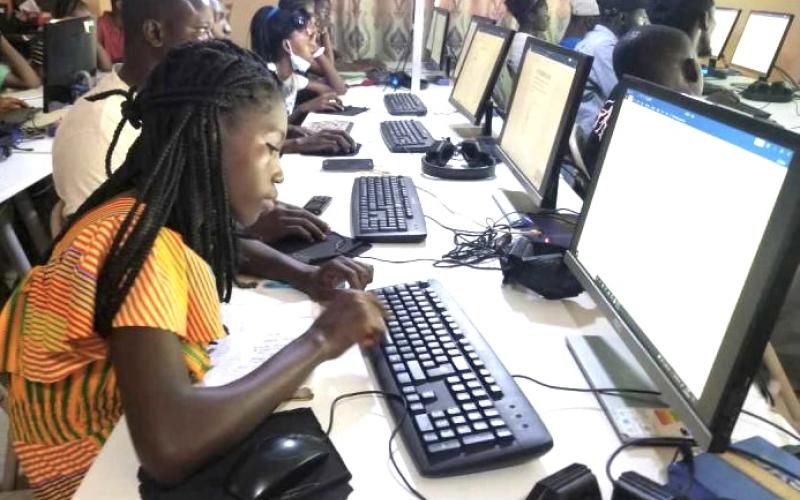
The inky black darkness of night is receding as the sun goes up. It’s 7 am and I hear the dreaded footsteps of my mother on her way up the stairs. In a matter of seconds, she opens my door, turns on my light, nudges my shoulder, and tells me “it’s time to wake up.” 5000 miles west and four hours earlier (West Africa is 5 hours ahead of the East Coast), a 15-year-old girl awakens to her alarm clock. However, instead of the nudging of her mother or a wailing alarm clock, she hears the clucks and screeches of hens and roosters outside of her home.
This teenager lives in Sierra Leone, a relatively small country located in Western Africa with a population of around 8 million people. My home state of Virginia has a larger population with about 8.5 million people and is actually about 30% bigger in landmass than Sierra Leone. On a personal journey to find out more about the daily life of African children, I sent a survey to teenagers in Sierra Leone that attend a youth center run by a non-profit organization called Develop Africa.
So why do I care, you may ask? My parents sponsored a child named Emily in Uganda, Africa the same year I was born, over 16 years ago. I grew up reading and writing letters to and from Emily, and this sparked my interest to conduct a survey to look at the similarities and differences between the life of an African teenager such as Emily and my life as a teenager in America. My survey included 10 questions about their daily life, such as “when do you wake up?” and “what do you think about school?”. The information I received from these answers allows me to compare my experience as a 16-year-old in Richmond, Virginia to some aspects of the experience of teenagers in Sierra Leone.

When reading through the responses to the survey, I am surprised to find many core similarities in our daily life, yet I also realize how different our lives are from each other. Starting at the beginning of the day, most of us in both Sierra Leone and in Richmond, Virginia wake up around the same time. More than half of the 34 Sierra Leonean teenagers wake up between 6:00-7:00 am on a weekday, which is generally the same time my classmates and I wake up. When asked what images and sounds they see and hear upon waking up, some responses were very familiar to me, such as family voices, the phone, and alarm clocks. However, in addition to waking up to animals outside of their homes, a number of teenagers talk about their first images in the morning being related to God. A fifteen-year-old girl says that when she wakes up, Jesus is the first image she sees. Another person says that the first thing he hears in the morning is not animals or an alarm clock, but the prayers of his family. And another 19-year-old boy wakes up to the sounds of prayer. Spirituality appears to be an important aspect in the lives of my surveyed group of teenagers, making me wonder how common this is across Sierra Leone.
Two other notable similarities emerge around breakfast and physical activity. The first is the presence of carbohydrates for breakfast although they are different in type. Cereal, a breakfast food made with roasted grain, is a very common breakfast for American teenagers. Rice and bread is a very common breakfast and lunch for teenagers in Sierra Leone. Another example is that most of us do something active after school. Whether it's African football, balance ball, dancing, or hide and seek, many Sierra Leonean teenagers said they engage in some sort of physical activity when school lets out. The same goes for American teenagers, whether we are playing football, dancing, playing lacrosse, or doing another activity, many of us also find value in physical activities after school.
While there are several similarities between teenagers in Sierra Leone and the United States, there are also some notable differences. One example around food is in regards to the consumption of meat. In my survey given to the students at the Develop Africa youth center, very few teenagers report eating meat for lunch. Whereas, it is common for American teenagers to eat some sort of meat for lunch, even if it’s normally not that great at my school cafeteria! Another difference is their workload after school. Half of the surveyed teenagers have some form of job or chores after school, whether it is a “real job” working for money or performing daily chores around the house. Homework is not their only task after school like it is for many of my friends and me.
One last difference that I believe is the most significant - and perhaps the most convicting - is something more intangible. The Sierra Leonean teenagers I surveyed seem to have a deep and meaningful appreciation for things that I, quite frankly, take for granted. Every single person surveyed responded that they liked school ... and I can assure you that if I polled 34 students in my 10th grade, you would be lucky to find a handful that said the same thing. One Sierra Leonean named Aliesious M. says “I came from a very poor family background. My mother died before she gave birth to me, but I thank God for my life” Another says “I lost my mum and dad when I was a boy, and I have been living with my uncle all my life, and I really love teaching and helping the poor.” These quotes capture the gratitude and appreciation they have for life amidst circumstances that sound much more challenging than anything I have ever faced.
Our family was quite sad when we received our last letter from Emily in 2019 as she “outgrew” her sponsorship, but we were so happy as she described the impact our sponsorship had on her life. Watching our sponsor child grow up alongside me was deeply personal, but in some respects, she often felt very far away. Being able to read through my survey answers from over 30 kids around my age feels much more tangible and “real.” It surprises me how much we have in common. Also, the differences feel much more meaningful and remind me of how much I have been given. I am still trying to figure out what I will do next with all of this valuable insight into their lives, so check back here in a few months to see where this journey will go next!
By Oliver Smith
November 9th, 2021

